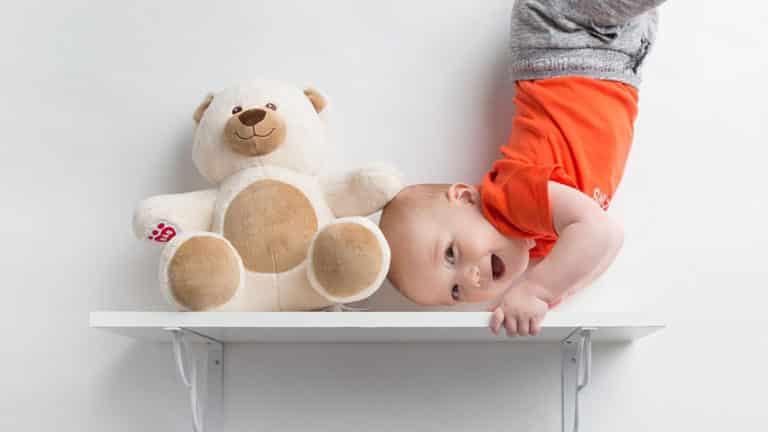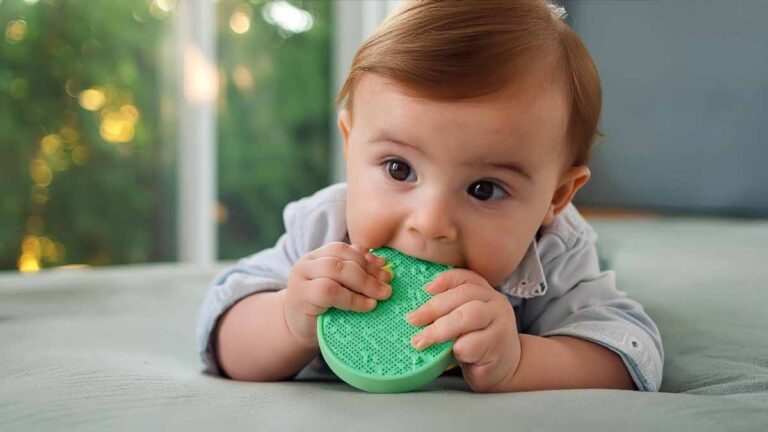Welcome to motherhood. You just had a baby, or you’re about to, and you’re Googling things like “newborn won’t stop crying” or “will my baby know I’m her mother?” First, breathe. Everything you’re feeling right now is normal. This guide is here to walk you through the first few weeks as a newborn mom. What to do for your baby, how to care for yourself, and how to survive the chaos with your sense of humor (mostly) intact.
I’ve been there. I read the baby books, bought all the things, and thought I was so ready to be a mom. Next thing I know, I’m frantically Googling with one hand to find answers to all the little things I never even knew I needed to know! So I’m going to go over some of the basics, but I’m also going to share the random but extremely helpful tidbits I picked up along the way.
This post may contain affiliate links. If you make a purchase after clicking one, I may receive a small commission at no cost to you.
What to Do Right Away: The First 72 Hours
Your newborn needs food, warmth, a clean diaper, and your voice. That’s about it. But in those first three days, every cry and squirm can feel like a catastrophe about to strike.
Feeding Comes First
Whether you’re breastfeeding or using formula, your baby needs to eat about every 2-3 hours. If you’re breastfeeding, don’t be afraid to ask for help from a lactation consultant. Latching might not be intuitive for either of you, and sore nipples or engorgement can make the process even trickier.
If you’re bottle-feeding, make sure the formula is mixed correctly, bottles are sterilized, and feeding cues are followed closely. Cluster feeding, particularly in the evening, is completely normal.
Please know that while most women are absolutely able to breastfeed without any significant issues, some are actually unable to – and I found out I was one of them after weeks of agony trying to. My daughter lost a ton of weight in the first few days and was constantly hungry. I didn’t want to formula feed, all of my doctors and nurses acted like there was no reason I should need to, and I nearly starved her.
I only learned much later that I have mammary hypoplasia, a condition that makes the production of breastmilk significantly reduced or impossible. No matter how much I fed and pumped, I could only produce one ounce TOTAL every two hours. Please know that needing to give your baby formula is NOT a failure.
Burping and Spit-Up
Most babies need help burping after feeds to release trapped air. Keep a burp cloth nearby because spit-up happens – a lot. Frequent burping can reduce discomfort and help prevent excessive spit-up, which, while messy, is typically harmless unless it’s forceful or projectile. Always keep your baby upright for at least 15-20 minutes after feeding to help digestion.
My daughter cried during burping, and it turned out she had very severe infant reflux that required medication. I could literally see the milk bubbling back up to her mouth when she cried! Contact your pediatrician ASAP if you suspect reflux – it will save your sanity. Check out the bottles I recommend for battling this, too.
Normal Diaper Usage
Expect 6-8 wet diapers and at least 3-4 dirty ones each day. The color of newborn poop changes quickly, from black meconium to green to mustard yellow. This is all normal! Monitoring wet and dirty diapers helps track hydration and feeding success.
Use diaper cream to prevent rashes and stock up on burp cloths and wipes. You will use SO many of both of these.
Sleep
Newborns sleep up to 18 hours a day – just not in stretches that help you function. Sleep often comes in 2-4 hour bursts. Practice safe sleep by placing your baby on their back on a firm, flat surface in a bassinet or crib. No blankets, pillows, or toys.
I started out adamantly against using things I thought my daughter could become “dependent” on. But she would NOT go to sleep – like, at all. One night, I randomly tried a white noise app on my phone. She instantly stopped crying, her eyes rolled back in her head in bliss, and she immediately fell asleep. I ordered a sound machine right after, and have no regrets 10 years later!
Not Every Cry is an Emergency
Your baby might cry for a number of reasons: hunger, cold, overstimulation, gas, or just adjusting to the world. Colic – defined as inconsolable crying for more than three hours a day, three days a week – can be incredibly stressful but usually resolves by three months. If it doesn’t, there’s a really good chance you’re dealing with reflux or another medical issue that needs to be addressed.
Try soothing strategies like swaddling, rocking, and gentle shushing. If nothing helps, it’s okay to place your baby in a safe spot and take a short break! Then reach out to your pediatrician as soon as you can.
Your Recovery in the First Few Days
You just had a baby. That means you are healing, physically and emotionally. Give yourself permission to slow down.
Bleeding, Swelling, and Pain are Normal
Vaginal bleeding, known as lochia, can last up to six weeks. You might also feel sore, swollen, or bruised, especially if you had a vaginal delivery. A peri bottle, ice packs, and sitz baths are your best friends.
For C-section recovery, care for the incision site, monitor for signs of infection, and avoid lifting anything heavier than your baby. I DID have a staph infection after my first C-section. My delivery doctor refused to acknowledge what it was for weeks, which led to many more medical issues. Be sure to advocate for yourself and ask for a new doctor if your gut tells you something is wrong.
Hormonal Shifts Can Be Intense
The emotional rollercoaster hits fast. Estrogen and progesterone drop rapidly after birth, leading to mood swings, weepiness, and even night sweats. Welcome to the fourth trimester!
These changes are normal, but if your mood continues to decline or you feel unable to cope, you might be dealing with postpartum depression or anxiety. Because on top of these hormonal fluctuations, taking care of a baby is hard – so it’s important to ask for help when you need it.
Even More Breast Changes
Engorgement, leaking, and tender nipples are common whether you’re breastfeeding or not. A supportive nursing bra, warm showers before nursing, and cold compresses after can provide relief. Be alert for signs of mastitis – such as red, hot areas on your breast, fever, or flu-like symptoms – which require medical attention.
Have Snacks and Drinks on Hand
Your body needs fuel to recover and function, especially if you’re breastfeeding. Keep a water bottle and easy snacks like trail mix, granola bars, and fruit near your nursing station.
For me, I had a reclining loveseat in the living room with a console for snack storage! Before I knew breastfeeding wasn’t in the cards, my mom brought me lactation cookies to keep nearby. Consider taking a postnatal vitamin to support your body’s needs.
Don’t Forget Your Pelvic Floor
Your pelvic floor has been through a lot. Gentle Kegel exercises, once cleared by your provider, can help with healing and prevent issues like incontinence down the road. If you experience pain, pressure, or heaviness, consider seeing a pelvic floor physical therapist.
Emotional Survival: Your Mind Matters Too
The one thing I forgot to take care of after my daughter was born? Myself.
Postpartum Emotions
I touched on this in the hormonal shifts section, but it bears repeating. You may swing from elation to tears within the same minute. Baby blues typically resolve within two weeks. If your feelings persist, worsen, or you feel disconnected from your baby, it could be postpartum depression or anxiety.
You are NOT alone, and help is available through your provider, support groups, and organizations like Postpartum Support International.
Skin-to-Skin Contact Builds Connection
Holding your baby close regulates their body temperature, stabilizes heart rate, and supports breastfeeding. But skin-to-skin is beneficial for both mom and baby, especially in those early hours and days.
Please know this doesn’t mean you should feel obligated to smush against your newborn 24/7. Skin-to-skin also works great with OTHER people – like your partner!
You Might Not Fall in Love Instantly
The movies lied. Sometimes bonding takes time. That doesn’t make you a bad mom – it makes you human. Eye contact, snuggles, and simple routines will strengthen your connection day by day. I wasn’t head over heels for my husband the first time we met, either. Some of us moms need time to warm up to someone new, even if we birthed them.
Week 1 to Week 4: Finding a Rhythm
No matter how ready you think you are, your world is turned upside down when you bring a new baby into your home. Here’s how to find your new groove.
Feeding Changes Fast
Feeding sessions may become longer or more frequent. Growth spurts and cluster feeding are exhausting but normal. Track feedings if it helps, but don’t stress over exact timing. Watch your baby for hunger cues like rooting, sucking on hands, and fussiness.
Reflexes Are Weird But Normal
Newborns come equipped with reflexes like the Moro (startle), rooting, and grasp reflex. These help them feed, bond, and stay safe. They can look dramatic but are healthy signs of neurological development.
My daughter’s Moro reflex was violent and frequently ruined attempts at putting her down after she fell asleep. Invest in a solid swaddle to keep those arms in place.
Don’t Put Off Starting Tummy Time
I did, and I shouldn’t have! I was so overwhelmed with my breastfeeding struggles that I didn’t make time to put my daughter on her tummy right away. She ended up with a flat spot on her head, too, that I had to work hard to correct.
Just a few minutes of supervised tummy time each day helps build neck, back, and shoulder strength. Start with short sessions after diaper changes or naps and gradually increase as your baby grows stronger.
Bathing Doesn’t Need to Be Daily
Newborns don’t usually get that dirty. Sponge baths are enough until the umbilical stump falls off, which could take a few days to a few weeks. Flaky skin and baby acne are common and usually clear on their own – just don’t pick at it.
One area I didn’t realize could get so gross, though, was under the chubby little chin/neck rolls. Between sweating in the summer heat and having reflux, my daughter had some pretty gross buildup in there! Lift the chin and swipe the neck with a soft, wet washcloth a couple times a day to prevent it.
Growth is a Good Sign
Your baby should be gaining weight steadily, having regular wet and dirty diapers, and meeting early milestones like tracking objects with their eyes. Ask your pediatrician about growth percentiles and developmental checklists.
Your Body & Identity in the First Month
Between rapid changes in your physical appearance and literally feeding a tiny human, your body doesn’t really feel like yours anymore.
You Are Still Healing
Just because you’re home doesn’t mean you’re done recovering. Your uterus is still contracting, your muscles are sore, and your energy is spread thin across sleepless nights and constant feedings. Respect your limits. Accept help when it’s offered. Listen to your body, and rest when you can – even if it’s only in 15-minute chunks.
Mental Health Isn’t Optional
If you feel anxious all the time, have intrusive thoughts, or feel numb or hopeless, you need support. Postpartum depression and anxiety can show up in unexpected ways. You might feel fine during the day but overwhelmed at night. You might be scared to be alone or terrified something bad will happen.
Therapy, medication, and support groups can help. There is no shame in needing help – only strength in asking for it. If you don’t know where to start, your baby’s pediatrician will likely have some recommendations for where to turn!
Mom Guilt is Real
You may feel guilty for not enjoying every moment. That doesn’t make you ungrateful. It makes you honest. Social media can make it seem like everyone else is loving every second – but they’re not. Open up to other moms – they get it, and will likely be relieved to hear they’re not alone, either. You are doing an incredible job, even if it doesn’t always feel that way.
Movement Can Help
When your provider clears you, gentle walks and stretching can improve your mood and support healing. Even just walking around the block or doing a few light stretches can ease stiffness and boost energy.
Pelvic floor rehab, especially after a vaginal birth, can restore function, reduce discomfort, and prevent long-term complications. If something doesn’t feel right, bring it up – it’s not “just part of being a mom.”
Trying to Create a Routine
Routines are one of the best things you can do to reclaim your mental health. Unfortunately, that is easier said than done with a newborn.
Your Baby Won’t Follow a Schedule
Routine is more about rhythm than rigidity. Your newborn doesn’t care about clocks – they care about comfort, milk, and being held. Instead of forcing naps or feedings at set times, learn to observe patterns.
Are they always fussy after 5 p.m.? Do they nap longer in the morning? Build your day around those cues instead of trying to dictate them. Even recognizing the smallest pattern can make the days feel more predictable.
Sample Daily Flow
Your day might look like this: feed, change diaper, short awake time with tummy time or gentle play, nap. Then do it all again. You may repeat this cycle 8-12 times a day. Try to limit outside demands – visitors, errands, overambitious housework – so your primary focus can be bonding with your baby and getting some rest.
The reality is that no matter how badly you’d like to have a predictable schedule, it’s just not going to happen right now. It will, and maybe sooner than you think. But for now, take the day one single moment at a time.
Choose One Anchor Habit a Day
When the whole day feels like chaos, anchoring yourself with one consistent habit can bring surprising relief. Maybe it’s drinking a full cup of hot coffee before it goes cold. Maybe it’s a 5-minute journal entry during a nap. This might sound weird, but when my daughter was born the only TV programming we had was through rabbit ears (we were too broke for streaming) – and I watched the Wendy Williams show at the same time every day. I didn’t even particularly love the show, but it was comforting that it was there without fail.
Choose something that reminds you that you are still here, too – not just someone’s food source and laundry manager. One small win can create a ripple effect that changes how the whole day feels.
The Things No One Has Told You
For whatever reason, the women you know IRL that have had babies will not share this info unprompted. But I know it would’ve made me feel way better if someone had!
You Will Google Absurd Things
From “milk coming out of baby’s nose” to “what do dropped balls look like,” the questions pile up fast. You’ll check baby’s breathing during naps, Google whether it’s normal for your baby to sound like a tiny kitten (it is), and fall down late-night Reddit rabbit holes. Use trusted sources like AAP, KellyMom, and La Leche League to avoid misinformation.
You’ll Be Desperate for a Break, Then Immediately Miss Them
Touched-out is real. So is the aching tenderness you feel when you finally get a minute to yourself, and suddenly miss their warm little body. It’s confusing, and it’s okay. You’re bonding and becoming someone new all at once. That’s hard.
You’ll Get Too Much Advice
Unsolicited opinions will fly at you from every direction: neighbors, in-laws, strangers on Facebook. Some will contradict what your pediatrician told you five minutes ago. It’s okay to smile, nod, and ignore most of it. Your parenting choices don’t require public approval. Protect your peace.
It’s also worth noting that even doctors get things wrong sometimes! My daughter’s pediatrician and I butted heads more than a few times in the beginning. When it turned out that my intuition was right and her textbook approach was wrong – twice – she made more of an effort to listen to me.
If you’ve been preparing for your baby by reading as much as possible from a variety of sources, there’s a good chance you’ll know exactly what’s wrong and what to do before anyone else does.
You Don’t Have to Love Every Minute
You will have moments of joy – and moments where you feel like you’re unraveling. That’s not failure. That’s parenthood. You’re allowed to be exhausted, frustrated, bored, and deeply in love with your baby all at the same time. Let go of the Instagram fantasy. The real version is messier – and far more meaningful.
Your Partner Can Develop PPD, Too
I definitely had a lot of bad days after my daughter was born. I was exhausted, I couldn’t get my stupid boobs to make enough milk to not need formula, and she cried – a LOT. But I powered through. I never felt completely hopeless. I knew we’d get through it.
My husband, on the other hand, did not handle the struggle so well. Our feeding cycles were never-ending between breastfeeding, syringe feeding (to avoid bottle nipples), and pumping. He couldn’t see the light at the end of the tunnel. And even silly little things, like not having time to play his favorite video game, were making him feel like the life he enjoyed before was completely gone.
He got really sad. And I recognized what it was. I sent him to sleep at his parents’ house one night to get away from the crying and constant work while my mom helped me instead. His parents also had some long talks with him. He came back a little more hopeful, refreshed, and ready to find his “new normal” at home.
What You Actually Need
Baby products (and mom marketing) are a big industry. They want you to spend money, and they know you’ll pay anything for a happy baby. Here’s what you’ll actually use.
Baby Essentials
Diapers, wipes, onesies, swaddles, burp cloths, pacifiers, a safe sleep space (bassinet or crib), bottles, and a bottle sterilizer or breast pump are the primary items. You’ll also want diaper cream, a gentle baby wash, and a soft brush for cradle cap. Keep a stash of extra clothes in every room – babies have a way of timing messes with terrifying precision.
The one non-essential piece of equipment for your newborn I’d recommend is a swing. For the first few months, it was the only way I could get my daughter to nap without being held. Naps aside, it kept her happy (enough) long enough for me to shower, too.
Mom Essentials
Nursing pads (disposable or reusable), nipple cream, peri bottle, snacks, water bottle, a button-down gown for easy nursing, and a nursing pillow. Keep your recovery station stocked with maxi pads, stool softeners, and a heating pad if needed. You’ll feel more human when you’re comfortable and cared for.
As far as my favorite non-essential for YOU, buy the biggest Stanley cup you can carry, full of liquid, with one hand. Reducing the need to get up is top priority when it both hurts (I had a C-section) and you don’t want to wake the newborn sleeping on your chest! And staying hydrated is super important when you’re trying to breastfeed.
Other Nice-to-Haves
A baby carrier for hands-free cuddles, a white noise machine for better naps, and extra pacifiers for when one inevitably vanishes into the void. A comfy recliner or glider can make all the difference during those long feeding sessions. Also nice: a few large muslin blankets that perform quadruple duty as burp cloths, nursing covers, and swaddles.
When to Call the Doctor (or Head to the ER)
While “better safe than sorry” is my general motto, I had a tendency to jump the gun when it came to my newborn. But my gut was often right – because my daughter experienced several genuine issues.
Call for Your Baby If…
They have a fever (100.4°F/38°C or higher), are excessively sleepy or difficult to wake, refuse multiple feedings in a row, have signs of dehydration (no wet diaper in 8+ hours), are breathing rapidly or with grunting noises, or appear jaundiced (have yellowish skin or whites of the eyes). Watch for signs of infection at the umbilical stump or circumcision site.
If you’re having trouble feeding, call and ask to schedule a tongue-tie check with a specialist – in my experience, pediatricians don’t always recognize it. Thrush is also a common problem, so check the top of the tongue for white patches. If your baby eats okay but cries after every feeding, that is a sign of infant reflux. Trust your gut – if something feels off, call.
Call for YOU If…
You experience heavy bleeding (soaking more than one pad per hour), large blood clots, signs of infection (fever, foul-smelling discharge), severe headaches, chest pain, or vision changes.
Mentally, if you feel hopeless, emotionally numb, or have thoughts of harming yourself or others, seek help immediately. These symptoms are signs of a postpartum emergency – not a moral failure.
Ask About Screenings
Newborn screening tests – including the heel prick, hearing test, and heart screening – are often done in the hospital or shortly after. Ask your pediatrician to explain the results and what follow-ups, if any, are needed. These screenings detect rare but serious conditions that benefit from early treatment.
Asking for Help Isn’t Shameful
PERIOD.
Delegate for Survival
Let others fold laundry, bring meals, or hold the baby while you nap. You are not less of a mother for asking for help – you are a smart mother. A well-rested, supported mom can show up more fully for her baby.
Parental Leave Isn’t Always Peaceful
Whether it’s six weeks or six months, parental leave is not a vacation. It’s exhausting, essential time for recovery and bonding. Don’t feel obligated to entertain guests or meet milestones. Use this time to focus on rest and connection. Set boundaries early and unapologetically.
If your partner gets parental leave as well, make it clear to them that their “job” during that time is to help YOU take care of your newborn. You should both have opportunities to relax.
Your Partner Should Want to Help
Give them meaningful ways to bond – bath time, bottle feeds, middle-of-the-night snuggles, and even diaper duty. Let them find their own rhythm, even if it’s not how you’d do it. You’re in this together, and that means sharing the messy, imperfect, wonderful work of parenting.
Self-Care Isn’t Optional
It’s not enough to just be aware of the signs of your own emotional distress. Get ahead of it by making time for yourself, ASAP.
Start Small
Brush your teeth. Sit by a window. Drink a full glass of water. These tiny wins add up. Even five minutes of doing something just for you – like listening to music in peace, or stretching – can shift your mindset.
Talk to Someone Daily
Even when you’re with a baby 24/7, you can start to feel lonely very quickly. Call a friend. Text another mom. Talk to your partner or a therapist. Say what you’re feeling out loud. Connection is a lifeline, especially when the days feel long and isolating.
This Isn’t Indulgent
It’s not about “treating yourself” with alone time. Taking care of yourself is not selfish. It’s necessary. You are the foundation your baby relies on. When you take time to support your mental and physical health, you’re investing in your baby’s well-being, too.
Resources That Can Help
If you’d like more details about how to navigate life as a newborn mom, check out these official and highly reputable websites.
- Postpartum Support International
- La Leche League for help with breastfeeding
- American Academy of Pediatrics (AAP) for the latest recommendations
- KellyMom
- Local mom support groups
You’re the Right Mom for This Baby
How do I know that? Because you care enough, are worried enough, to have read this far. That makes you a good mom.
You won’t get it all right, and that’s okay. What matters is showing up, loving your baby, and taking care of yourself, too. This season is temporary. It’s hard, beautiful, and transformative. You’ve got this – one bleary-eyed, spit-up-covered moment at a time.








